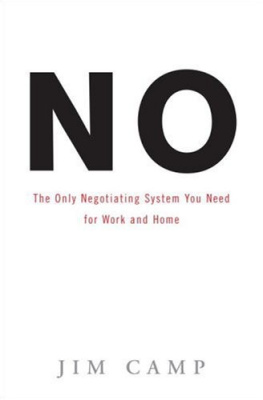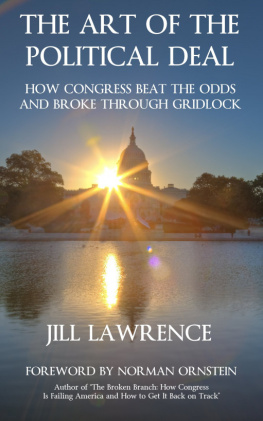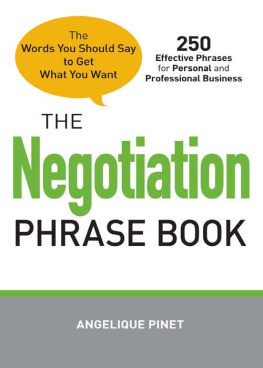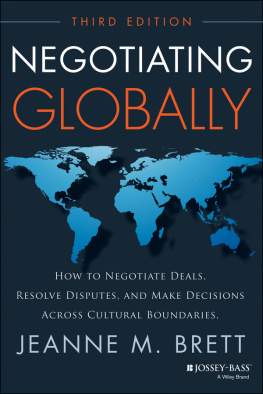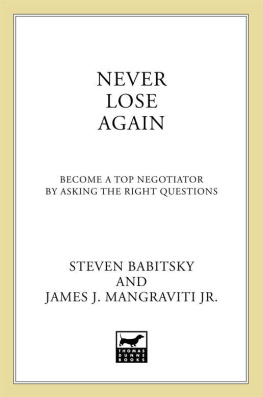Jim Camp - Start with NO...The Negotiating Tools that the Pros Dont Want You to Know
Here you can read online Jim Camp - Start with NO...The Negotiating Tools that the Pros Dont Want You to Know full text of the book (entire story) in english for free. Download pdf and epub, get meaning, cover and reviews about this ebook. year: 2002, publisher: Crown Business, genre: Business. Description of the work, (preface) as well as reviews are available. Best literature library LitArk.com created for fans of good reading and offers a wide selection of genres:
Romance novel
Science fiction
Adventure
Detective
Science
History
Home and family
Prose
Art
Politics
Computer
Non-fiction
Religion
Business
Children
Humor
Choose a favorite category and find really read worthwhile books. Enjoy immersion in the world of imagination, feel the emotions of the characters or learn something new for yourself, make an fascinating discovery.

Start with NO...The Negotiating Tools that the Pros Dont Want You to Know: summary, description and annotation
We offer to read an annotation, description, summary or preface (depends on what the author of the book "Start with NO...The Negotiating Tools that the Pros Dont Want You to Know" wrote himself). If you haven't found the necessary information about the book — write in the comments, we will try to find it.
For years now, win-win has been the paradigm for business negotiationthe fair way for all concerned. But dont believe it. Today, win-win is just the seductive mantra used by the toughest negotiators to get the other side to compromise unnecessarily, early, and often. Have you ever heard someone on the other side of the table say, Lets team up on this, partner? It all sounds so good, but these negotiators take their naive partners to the cleaners, deal after deal. Start with No shows you how they accomplish this. It shows you how such negotiations end up as win-lose. It exposes the scam for what it really is. And it guarantees that youll never be a victim again.
Win-win plays to your emotions. It takes advantage of your instinct and desire to make the deal. Start with No teaches you how to understand and control these emotions. It teaches you how to ignore the siren call of the final result, which you cant really control, and how to focus instead on the activities and behavior that you can and must control in order to negotiate with the pros.
Start with No introduces a system of decision-based negotiation. Never again will you be out there on a wing and a prayer. Never again will you feel out of control. Never again will you compromise unnecessarily. Never again will you lose a negotiation.
The best negotiators:
* arent interested in yesthey prefer no
* never, ever rush to close, but always let the other side feel comfortable and secure
* are never needy; they take advantage of the other partys neediness
* create a blank slate to ensure they ask questions and listen to the answers, to make sure they have no assumptions and expectations
* always have a mission and purpose that guides their decisions
* dont send so much as an e-mail without an agenda for what they want to accomplish
* know the four budgets for themselves and for the other side: time, energy, money, and emotion
* never waste time with people who dont really make the decision
Start with No offers a contrarian, counterintuitive system for negotiating any kind of deal in any kind of situationthe purchase of a new house, a multimillion-dollar business deal, or where to take the kids for dinner. It is full of dozens of business as well as personal stories illustrating each point of the system. It will change your life as a negotiator. If you put to good use the principles and practices revealed here, you will become an immeasurably better negotiator.
Jim Camp: author's other books
Who wrote Start with NO...The Negotiating Tools that the Pros Dont Want You to Know? Find out the surname, the name of the author of the book and a list of all author's works by series.

